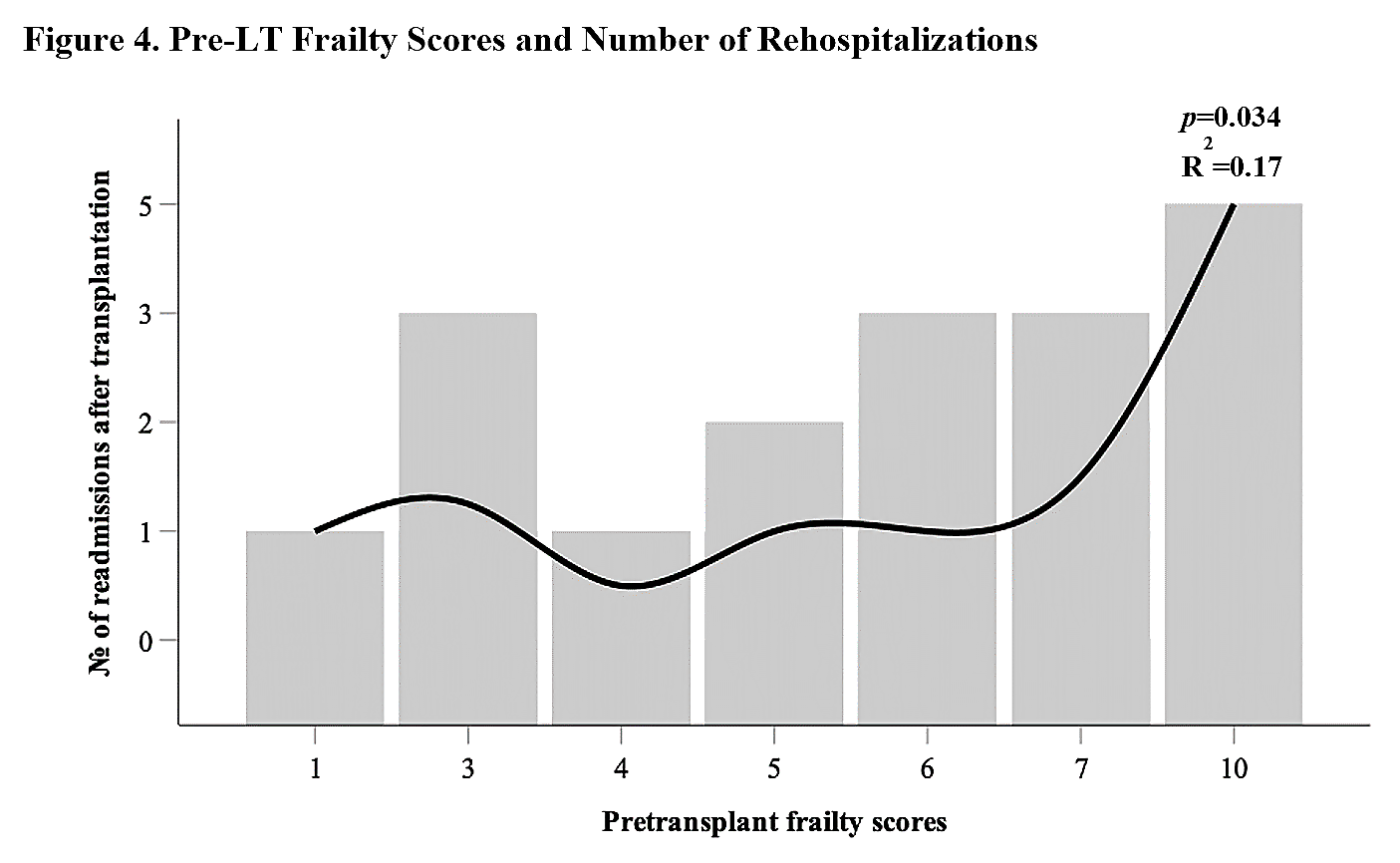
Frailty in pediatric liver disease is associated with an increased incidence of readmissions after pediatric liver transplantation
Michael Shpoliansky*1,2, Saleh A Alqahtani*3, Shannon M Vandriel1,2, Fatema Johara1,2, Claudia Quammie1,2, Eberhard Lurz4, Estella M Alonso5, James F Daniel6, Veena L Venkat7, Dainiel H Leung8, Julie Economides8, Evelyn K Hsu9, Kathleen M Loomes10, Nitika A Gupta11, Dana Mannino12, Jerome Menendez13, Vicky L Ng*1,2,14, Binita M Kamath*1,2.
1Division of Gastroenterology, Hepatology and Nutrition, The Hospital for Sick Children, Toronto, ON, Canada; 2University of Toronto, Toronto, ON, Canada; 3Department of Pediatrics, Imam Abdulrahman Bin Faisal University, Dammam, Saudi Arabia; 4Department of Pediatrics, Division of Gastroenterology and Hepatology, Dr. von Hauner Children's Hospital, University Hospital, LMU, Munich, Germany; 5Division of Gastroenterology, Hepatology and Nutrition, Ann & Robert H. Lurie Children’s Hospital of Chicago, Chicago, IL, United States; 6Division of Pediatric Gastroenterology, Children’s Mercy Hospital, Kansas City, MO, United States; 7Division of Pediatric Gastroenterology, Hepatology and Nutrition, Children’s Hospital of Pittsburgh, Pittsburgh, PA, United States; 8Division of Gastroenterology, Hepatology and Nutrition, Texas Children’s Hospital, Houston, TX, United States; 9Division of Gastroenterology, Hepatology and Nutrition, University of Washington-Seattle Children’s Hospital, Seattle, WA, United States; 10Division of Gastroenterology, Hepatology and Nutrition, Children’s Hospital of Philadelphia, Philadelphia, PA, United States; 11Division of Gastroenterology, Hepatology and Nutrition, Children’s Healthcare of Atlanta Emory University School of Medicine, Atlanta, GA, United States; 12Division of Solid Organ Transplantation, Alfred I. duPont Hospital for Children, Wilmington, DE, United States; 13Division of Pediatric Gastroenterology, Levine Children’s Hospital Carolinas Health Care Center, Charlotte, NC, United States; 14Transplant and Regenerative Medicine Centre, The Hospital for Sick Children, Toronto, ON, Canada
Introduction
Frailty is a phenotype of cumulative decline leading to decreased physiologic reserve and vulnerability to stressors. Frailty is associated with adverse outcomes after liver transplantation (LT) in adults, but similar data are not available in children. A prospective multicenter study previously determined that frailty is present in 46% of children with end stage liver disease (ESLD). We utilized this cohort to evaluate the impact of pre-transplant frailty on post-LT outcomes.
Method
The study included participants from the original frailty study across 10 North American transplant centers who had subsequently undergone LT. Clinical outcomes were collected up to 1-year post-LT. Multivariate regression analysis of the data was performed, with significant pre-LT variables incorporated into the model.
Results
28 (60.7% female, 46.4% biliary atresia) pediatric LT recipients were included and stratified by pre-transplant frailty (defined by a pre-LT frailty score of ≥6.0). 54% of children met the criteria for frailty (n=15). Baseline characteristics were comparable between groups, however, those with frailty were significantly more likely to have pre-transplant failure to thrive (33.3% vs. 0%, p=0.044). Thirty-four hospital readmissions (22 in frail and 12 in non-frail children) occurred in 20 patients. Higher pre-transplant frailty scores were also significantly associated with an increased number of readmissions after transplantation (p=0.034, R2=0.17) .
.
Conclusion
Pediatric frailty is associated with the adverse outcome of increased frequency of hospitalization in the first year after pediatric liver transplantation. These data support the concept that frail children should be identified and targeted for prehabilitation prior to LT.
Funded by the Hospital for Sick Children Transplant and Regenerative Medicine Center Astellas Pilot Grant, Lina Sweeney Foundation and the Ashley’s Angels Fund.. *SAA and MS contributed equally to the manuscript as first authors, as well as VLN and BMK as last authors..
If you have any questions during the meeting, please go to the registration desk. Our emails will be monitored sporadically.
REGISTRATION DESK OPENING TIMES
Sunday, October 15, 16:00-18:00 Monday, October 16, 07:00-18:00 Tuesday October 17, 07:00-12:30